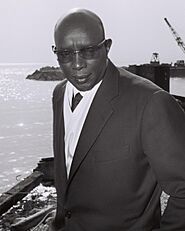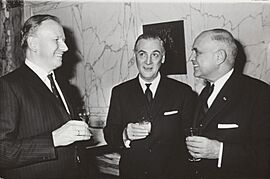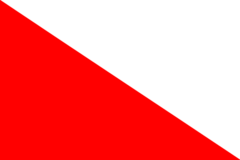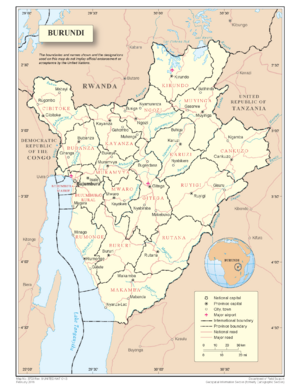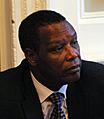Louis Rwagasore facts for kids
Quick facts for kids
Crown Prince
Louis Rwagasore
|
|
|---|---|
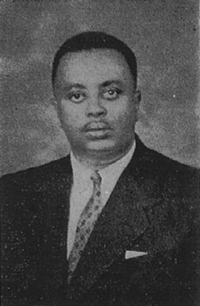
Rwagasore in 1961
|
|
| 2nd Prime Minister of Burundi | |
| In office 28 September – 13 October 1961 |
|
| Monarch | Mwambutsa IV |
| Governor | Jean-Paul Harroy |
| Preceded by | Joseph Cimpaye |
| Succeeded by | André Muhirwa |
| Personal details | |
| Born | 10 January 1932 Gitega, Ruanda-Urundi |
| Died | 13 October 1961 (aged 29) Usumbura, Ruanda-Urundi |
| Cause of death | Assassination |
| Political party | UPRONA |
| Spouse |
Marie-Rose Ntamikevyo
(m. 1959) |
| Parent |
|
Louis Rwagasore (Kirundi: Ludoviko Rwagasore; 10 January 1932 – 13 October 1961) was a prince from Burundi and an important politician. He served as the second prime minister of Burundi for a short time in 1961. He was born in 1932 in a place called Ruanda-Urundi, which was then controlled by Belgium. His father was Mwambutsa IV, the king of Burundi.
Louis Rwagasore went to Catholic schools in Burundi and later studied at a university in Belgium. When he came back to Burundi in the mid-1950s, he started groups called cooperatives. These groups helped local Burundians take control of their own businesses. This also helped him gain political support. The Belgian government took over his cooperatives, but this made him even more famous. He became a key leader in the movement to free Burundi from colonial rule.
He joined a political party called the Union for National Progress (UPRONA). Rwagasore strongly pushed for Burundi to become independent from Belgium. He also wanted national unity and a constitutional monarchy, where the king would share power with an elected government. He worked to make UPRONA popular with people from all parts of the country and different groups. The party's leaders included both Hutus and Tutsis.
The Belgian government did not like UPRONA or Rwagasore. They even put him under house arrest in 1960. But international pressure made them change their minds. In 1961, UPRONA won a huge victory in the elections. Louis Rwagasore became prime minister on September 28, 1961. Just two weeks later, he was killed. His death made it harder to unite the different groups in Burundi. It also caused problems within his party, UPRONA. Today, Louis Rwagasore is seen as a hero in Burundi. His death is remembered every year with big ceremonies.
Contents
Early Life and Education
Louis Rwagasore was born on January 10, 1932, in Gitega, which was part of Ruanda-Urundi. His father was Mwambutsa IV, the king of Urundi. His mother was Thérèse Kanyonga. Louis was part of the Ganwa family, which was a group of important people often linked to the Tutsis. His family had connections to many chiefs in Urundi.
His parents later divorced, and his father remarried. Louis started school at age seven, attending Catholic schools. In 1945, he went to the Groupe Scolaire d'Astrida for six years. In 1951, he traveled to Antwerp, Belgium, to study at the University Institute of Overseas Territories. He then studied at the Catholic University of Leuven, where he earned a degree in political economy.
Rwagasore returned to Urundi in December 1956. In April 1957, the Belgian government hired him to study economic and agricultural issues. On September 12, 1959, he married Marie-Rose Ntamikevyo, a Hutu woman. They had two daughters, but sadly, both died when they were babies.
Political Journey
Starting Cooperatives and Leading UPRONA
In June 1957, Rwagasore started groups called the Traders' Cooperatives of Burundi (CCB). His goal was to help local Burundians control their own trade. This also helped him gain support from traders in Usumbura. The CCB quickly became popular, attracting many merchants. It helped connect farmers in the countryside with traders in the cities.
The Belgian government was not happy about the CCB. They worried about Rwagasore's growing influence. However, they knew that arresting the king's son would make people angry. The CCB soon faced money problems, partly due to poor management. Rwagasore believed the Belgians were trying to stop his work. The Belgians, however, accused him of misusing money.
Rwagasore tried to get help from other countries, but it was difficult. He asked the Supreme Land Council for a loan for his cooperatives. Even though the Belgians disagreed, Rwagasore convinced the council to support him. But the Belgian government officially stopped the loan and took over the CCB. This struggle made Rwagasore even more famous as a leader against colonial rule. He also connected with Julius Nyerere, a nationalist leader from Tanganyika, who gave him advice and money.
Later, Rwagasore became involved with a new political party, the Union for National Progress (UPRONA). He quickly became the main leader of UPRONA. The party got early financial help from the Swahili people in Bujumbura. At first, UPRONA was linked to the Bezi family, a noble group, and supported traditional ways. But this changed when Rwagasore disagreed with his father, the king.
The king, Mwambutsa, had supported his son's political efforts at first. But he also encouraged other noble families to compete with Rwagasore. This was to make sure his own power as king remained strong. Mwambutsa did not care much for UPRONA. He was also worried about Rwagasore's strong anti-colonial speeches. The Belgian government even tried to distract Rwagasore from politics. They made him a chief in February 1959, but he soon quit to focus on his political career.
Under Rwagasore, UPRONA wanted to modernize Burundi. They wanted to keep some traditions but also bring new changes. Rwagasore used symbols of the monarchy to share his message. He often showed his status as a prince. But he also said UPRONA would only support the monarchy if it helped the Burundian people. He believed a constitutional monarchy was best, where the king would give most power to an elected government.
Rwagasore focused on Burundi's independence, unity, and the monarchy's legitimacy. He wanted Burundi to be neutral in the Cold War. He worked to make UPRONA a party for everyone, across different regions and groups. He tried to balance Hutu and Tutsi members in the party's leadership. However, Tutsi members often held the most important positions.
Rwagasore wanted "immediate independence" from Belgian control. He encouraged people to boycott European goods and not pay taxes. The Belgian government saw his strong desire for independence as extreme. They supported a rival party, the Christian Democratic Party (PDC). This party was seen as more moderate and did not want immediate independence.
The rivalry between UPRONA and PDC was also about old conflicts between noble families. The Bezi family supported UPRONA, and the Tare family supported PDC. These families had fought for power for a long time. In 1959, a Tare leader even questioned if Rwagasore's parents' marriage was proper. This was an attempt to challenge Rwagasore's right to the throne.
Elections of 1960 and 1961
In June 1960, Rwagasore attended the independence celebrations in the Republic of the Congo. When the Congo faced problems, he worked with another politician, Joseph Biroli. They asked for peace and harmony in Burundi. They said Burundi had a chance to be "an island of peace."
Before Burundi's first local elections in November 1960, Rwagasore urged people to "shake off foreign rule." But just before the elections, the Belgian government put him under house arrest. They said he broke a rule about royal family members not being involved in politics. They also accused him of having "rebellious" papers.
The Belgians hoped this arrest would weaken UPRONA. They also encouraged the PDC and other parties to form a group against UPRONA. Angry about their leader's arrest, UPRONA called for people to boycott the elections. The PDC won most of the offices. In early 1961, the Belgians set up a temporary government with PDC members, but no one from UPRONA.
Rwagasore was released on December 9, 1960. The United Nations (UN) then got involved. The UN made the political situation more open and gave Rwagasore his political rights back. After this, he could be involved in politics without problems from the Belgians.
In 1961, Ruanda-Urundi was officially renamed Rwanda-Burundi. For the 1961 national elections, UPRONA focused its campaign on Rwagasore. His strong personality helped gather a lot of support. He traveled across the country to introduce his party's candidates. He brought together many different groups, including Tutsi nobles, Hutu leaders, young activists, and people from cities and rural areas.
UPRONA presented itself as strongly supporting the monarchy. Their slogan was "God, Fatherland, Mwami (King)." The PDC had expected to win because of their success in the 1960 local elections. But they started their campaign too late. Their slogan, "God and Fatherland," seemed to many Burundians to be against the monarchy. This cost them a lot of support.
Burundi held national elections on September 18, 1961. About 80% of voters participated. UPRONA won 58 out of 64 seats in the Legislative Assembly. Rwagasore was chosen to form the new government. Two days later, he gave a speech on national radio. He called for peace and unity. He said UPRONA's victory was for "order, discipline, peace."
Belgian officials were not happy with Rwagasore's win. But they did appreciate his speech. Some PDC members rioted in Mukenke, angry about their loss. Rwagasore asked his supporters not to react, and the authorities quickly restored order. On September 28, the Legislative Assembly met to choose a new government. Most deputies voted for Rwagasore to lead.
He formed a government with 10 members, aiming for national unity. This government was approved by almost all deputies. Pierre Ngendandumwe became Vice Prime Minister. Rwagasore's brother-in-law, André Muhirwa, became Minister of Interior.
Rwagasore's government did not present a detailed plan right away. In his first speech, he promised to focus on the nation's real problems. These included economic issues, land problems, education, and social development. He said they would find their own solutions. Burundians generally welcomed his government. However, some Hutu members of UPRONA felt they were not represented enough.
His government did not control defense, foreign affairs, or technical help. These were still managed by the Belgian Resident. But Rwagasore wanted to reduce the Belgians' role to just giving advice. His government promised to include opposition members in the administration. He also supported a political union with Rwanda and Tanganyika. Later, he suggested an economic union with Tanganyika but no link with Rwanda, which had ethnic tensions. He also promised to address Hutu concerns.
However, UPRONA's victory caused unrest among the nobility. The Tare family saw Rwagasore's success as the Bezi family taking over. The existing conflicts between noble families grew worse. To promote peace, Rwagasore appointed a Tare member as Director of Tourism. The Belgian Resident in Burundi, Roberto Régnier, later said Rwagasore planned to give positions to some opposition figures.
Assassination
Who Was Responsible?
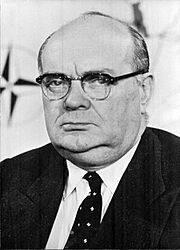
After Rwagasore was killed, people in Burundi immediately wondered if the Belgian government was involved. When Governor Harroy visited the hospital to see Rwagasore's body, Rwagasore's mother confronted him. She slapped him, showing her anger. The Belgian Foreign Minister, Paul-Henri Spaak, sent messages asking about the role of "Europeans" in the killing.
Spaak also worried about a UN investigation. He ordered Harroy to send a detailed report to calm international concerns. The United Nations General Assembly called for an investigation. A UN team went to Burundi to write a report. This team heard complaints from UPRONA leaders. They accused the Belgian administration of being involved in the murder. They also accused the father of rival PDC leaders, Chief Baranyanka. The UN report, however, did not support these accusations.
Many experts believe that the assassin, Ioannis Kageorgis, was just a tool. They think the murder was part of a political plan by rival PDC leaders, Biroli and Ntidendereza. The goal was to cause trouble and help the PDC gain power. Some historians believe these PDC leaders might have been encouraged by certain Belgian officials. Governor Harroy himself later admitted that denying Belgian support for the assassination "seems unreasonable."
Historian Ludo De Witte concluded that the Belgian Residency in Gitega was involved. He believes that the Belgian Resident, Régnier, and some of his helpers were responsible. De Witte suggested that Rwagasore's murder was part of a bigger plan. This plan was to cause a civil war, allowing the Belgians to step in and choose their own government, similar to what happened in Rwanda.
Regarding the motives of Biroli and Ntidendereza, some experts believe it was due to the rivalry between the Bezi and Tare noble families. Sabine Belva, the PDC's European secretary, testified that Régnier had asked if "eliminating Rwagasore had been considered." Régnier denied this in court. The Belgian judges said these comments were just "jokes."
Lawyers for Biroli and Ntidendereza also pointed to the responsibility of Belgian officials. But the judge rejected this. Some lower-ranking Belgian officials were told not to testify by the Belgian Foreign Ministry. A separate investigation in Brussels later gathered more evidence. An official named Hubert Léonard testified that Régnier had said, "Rwagasore must be killed!"
Régnier later admitted to saying this. The evidence from Brussels was not made public. But parts of it were shared with Burundian courts after Burundi became independent. Spaak threatened to stop aid to Burundi if they continued the investigation. But this never happened.
In 1972, the Burundian government accused Régnier of organizing Rwagasore's murder. For many years, the government did not talk about the assassination. But in 2001, some Burundian politicians asked the Belgian government to open an official investigation. On October 14, 2018, the Burundian government officially accused Belgium of being the "true backer of the assassination of Rwagasore." They said they would set up a commission to investigate, but no progress has been made since.
Impact on Politics
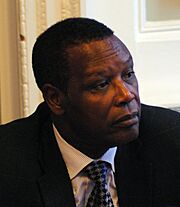
After Rwagasore's death, his brother-in-law, André Muhirwa, became Prime Minister of Burundi. Muhirwa did not offer a government plan, saying he was distracted by "recent events." The Legislative Assembly then met without much purpose for several months.
The discovery that opposition figures were involved in the assassination led to their execution. This ended any formal opposition in the Burundian parliament. Rwagasore's death stopped his efforts to unite different ethnic groups. It made Hutu-Tutsi tensions worse. Future governments were diverse but unstable.
The assassination also split UPRONA. Rwagasore's former helpers fought to become the party's new leader. Eventually, members of the Ganwa noble family took control. UPRONA then used Rwagasore's image to promote itself. But they ignored his vision for the party. It became a party that favored the Tutsi elite and ruled as a single party. Many Burundians believe Rwagasore's murder created a power vacuum. They think it led to the country's later instability.
Legacy
Burial and Official Remembrance
Rwagasore was buried on October 18, 1961, in Bujumbura. Burundi gained independence in 1962. In his speech for independence, Prime Minister Muhirwa honored Rwagasore. He gave him credit for leading the country to freedom.
From 1962 to 1963, a monument was built at Rwagasore's burial site. It included a mausoleum and three arches with a black cross. The Prince Louis Rwagasore Stadium was also built to honor him. The government paid for these projects by releasing postage stamps with his image in February 1963.
That year, October 13 was made a public holiday. A hospital and an avenue in Bujumbura were renamed after him. His image was also put on public buildings. The first Burundian franc banknotes featured his face. Two more series of stamps with Rwagasore were released later. One in 1966 paired his image with that of assassinated US President John F. Kennedy. Another in 1972 celebrated 10 years of Burundi's independence. Many schools and roads in Burundi are named after him. The country's first state airline named its only aircraft after him. The Legislative Assembly also created the Order of Prince Louis, a national award.
In 1966, Captain Michel Micombero led a military coup. He overthrew the monarchy and made Burundi a republic. He became president. UPRONA then became the only legal political party. Micombero called himself Rwagasore's "successor." During his time, Rwagasore was often honored in public ceremonies. His portrait remained common in public places.
In 1976, Micombero was overthrown by Colonel Jean-Baptiste Bagaza. Bagaza tried to present himself as a modern leader. So, Rwagasore's reputation competed with his own. As a result, Bagaza mentioned Rwagasore less. He also stopped celebrating the October 13 holiday. In 1987, Bagaza was overthrown by Major Pierre Buyoya. After ethnic violence in 1988, Buyoya declared a policy of national unity. He used Rwagasore as a symbol for this unity. Under Buyoya, more portraits of Rwagasore were hung. The mausoleum was renovated. An UPRONA-supported Rwagasore Institute was created to promote national peace.
In the 1990s, Burundi became more democratic. This included bringing back multiple political parties. The end of UPRONA's sole power led to less public celebration of Rwagasore. One new opposition party, Front for Democracy in Burundi (FRODEBU), mentioned Rwagasore in its publications. But it avoided linking him to UPRONA. FRODEBU won the elections in 1993. The new president, Melchior Ndadaye, did not attend any official events for Rwagasore in October. Ndadaye was killed in a coup attempt later that month. This led to a crisis and a civil war in Burundi. During this time, politicians often used Rwagasore's name for their own benefit. Newspapers also mentioned him when calling for peace.
In the late 1990s, groups in the civil war held peace talks. The Arusha Accords praised "Prince Louis Rwagasore and his companions." They said these leaders had kept Burundi from ethnic conflict. The peace agreements led to Pierre Nkurunziza becoming president in 2005. During his time, he attended annual celebrations for Rwagasore. He often mentioned him in his speeches. His government also repaired several monuments to Rwagasore. They built a new one honoring both Rwagasore and Ndadaye in Bujumbura. In 2019, he renamed Rwagasore Stadium. But he said the new parliament building in Gitega would be named after Rwagasore.
Popular Reputation
After his death, Louis Rwagasore quickly became known as a "hero and martyr." He is almost universally admired in Burundi. His speeches are often quoted in political discussions. Even his former political opponents and their families praise him. His assassination is remembered every year with large ceremonies.
Historian Christine Deslaurier wrote that his anti-colonial struggle made him a mythical figure. This is more than his political ideas. Another historian, Ludo De Witte, said Rwagasore has been seen as a "two-dimensional icon." Rwagasore's widespread popularity in Burundi is unique. Most other historical figures in the country have mixed feelings about them. He remains relatively unknown internationally. His story is often overshadowed by leaders like Nyerere and Lumumba. His assassination is also less known than the Congo Crisis and ethnic violence in Rwanda.
Images for kids
See also
 In Spanish: Louis Rwagasore para niños
In Spanish: Louis Rwagasore para niños
 | Audre Lorde |
 | John Berry Meachum |
 | Ferdinand Lee Barnett |


